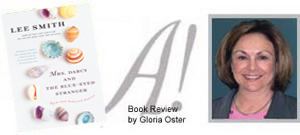

Lee Smith's latest work, Mrs. Darcy and the Blue-Eyed Stranger: New and Selected Stories, contains seven stories from two previous collections and seven new ones.
For a reader who enjoys quirky yet complex characters in fiction, these stories fit the bill. Successful writers understand, as Smith does, that real people are quirky and complex. Thus, these stories allow the reader to laugh, cry, and experience truth as only fiction can.
The brevity of the short story commands a writer interested in realistic fiction to perform a literary sleight-of-hand to conjure characters reminiscent of real people and their predicaments. Many of Smith's stories in this collection dissect relationships. Smith states in her interview with A! Magazine that "...[she is] more interested in the "long haul' than the transcendent moment, that epiphany which is the province of the poet and the young writer." Smith's comment distinguishes the new stories from the previously published ones in Mrs. Darcy and the Blue-Eyed Stranger.
In an earlier story, "Bob, a Dog," downtrodden Cheryl, abandoned by her husband who is living with another woman, is plagued with the uncontrollable dog who escapes his pen by whatever means available. As the story ends, Cheryl imagines couples she knows, including her husband and his new consort, engaged in various activities of "coupledom." Bob is digging as Cheryl muses. Smith writes:
Cheryl leaned back in her chair and opened the third California Cooler and laughed out loud finally as Bob scraped and shook himself off and lurched over to stand for a minute there by her chair before he took off running free across the darkened yards, beneath the yellow moon.
Bob's instinctive desire to live life on his own terms parallels Cheryl's laughter and a third California Cooler. Smith perfectly renders Cheryl's awakening to the impulse to live unfettered, oblivious to others' demands.
In contrast to Cheryl's "transcendent moment," a new story, "Stevie and Mama," exemplifies Smith's current interest in exploring "the long haul" that she spoke of in A! Magazine's interview. Roxie and Willie have a long history with each other, but have a previous history that makes their life together all the sweeter.
In her former life, Roxy was a "Miss Rose Hill" and married to Livingston, a lawyer who eventually made his way to the state legislature. After meeting Willie twice, 12 years apart, Roxie realizes the folly of her youthful decision to live the proper yet unexamined life with the ambitious Livingston. Willie is everything that Livingston isn't -- a free spirit, a musician, a college professor, a gourmet cook, and a terrible housekeeper. Roxy declares him the love of her life. They marry and leave the previous history behind.
Like many a married couple in a car together, Roxy and Willie spar over her perception of Willie's driving deficiencies. In a moment that reveals their obvious enjoyment of each other's company, Willie pretends to be the blind Stevie Wonder:
"You got to help me, Mama, I can't see a thing. I'm blind, Mama. Don't you forget I'm blind. Now where is that truck? I swear I jus can't see a thing out on this highway, where is we, Mama? Where we going?'
Willie's Stevie Wonder sends Roxy into paroxysms of laughter and into her role of Mama. Then Willie begins to sing "I Was Made to Love Her."
Roxy makes a discovery that threatens the longstanding security and love that Willie represents. At an emotional crossroads, she must determine whether she will confront Willie and perhaps leave the relationship behind. As the story ends, the two are driving along the Fernandina Beach road; Willie veers from the main road and onto the beach itself. Roxy fears they will be arrested, but says to Willie, "Now Stevie....You watch where you're going, honey. It's a mighty big ocean out there." Willie's response, "Shut up, Mama....You just stick with me," leaves little doubt that Roxie will do exactly that.
The title of this collection of short stories, Mrs. Darcy and the Blue-Eyed Stranger, derives from a story in Smith's Cakewalk, published in 1970. The reprinted story is the last one in the book. The reference to Jane Austen's Pride and Prejudice in which the high-spirited, but level-headed Elizabeth will become Mrs. Darcy seems deliberate.
The old and seemingly demented Mrs. Darcy does not succumb to her daughters' wishes to rob her of independence. When her daughters leave to go home -- or on to more pressing concerns -- Mrs. Darcy shows a surprising power. As the story ends, she settles into her deck chair to enjoy the peace of the night. Likewise, Elizabeth in Pride and Prejudice does not succumb to Lady Catherine's desire to convince her that she is unworthy of marrying Mr. Darcy. Elizabeth declares: "I am . . . resolved to act in that manner, which will, in my own opinion, constitute my happiness, without reference to you, or to any person so wholly unconnected with me."
Spunky to the end, Austen's Elizabeth and Smith's own Mrs. Darcy seem to mirror Smith herself, writing to "constitute her own happiness" and connect with those of similar mind. The first story in the collection preserves Cheryl's "transcendent moment" in "Bob, a Dog" and the last story in the collection captures Mrs. Darcy's ability to survive "the long haul." Fittingly, both characters are seated alone and self-satisfied at the end of each story. Smith's readers will also find themselves quite happily seated and entertained with the 14 stories found here, all filled with characters on journeys of self-discovery.
About the Reviewer: Gloria Oster is Director of Teacher Education at King College, Bristol, Tenn., and former high school English teacher at Sullivan South High School, Blountville, Tenn.
READ ON:
--An Interview with Lee Smith ...